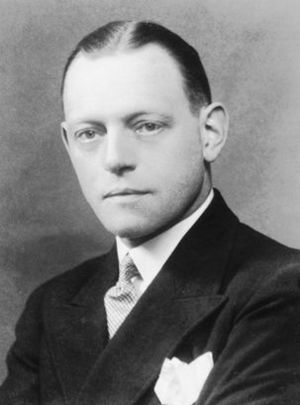Oswald Rayner facts for kids
Quick facts for kids
Oswald Theodore Rayner
|
|
|---|---|
 |
|
| Born | 29 November 1888 Smethwick, Staffordshire, England
|
| Died | 6 March 1961 (aged 72) Botley, Oxfordshire, England
|
| Known for | |
Oswald Rayner (born November 29, 1888, in Smethwick, England – died March 6, 1961, in Botley, Oxfordshire, England) was a British spy. He worked for the Secret Intelligence Service (MI6) during World War I. Rayner was active in the Russian Empire.
Some people believe he was involved in the plan to remove Grigori Rasputin. Rasputin was an influential figure in Russia at the time. However, official records from the British intelligence service (MI6) do not confirm this. There are no documents directly linking Rayner or other British agents to Rasputin's death.
Contents
Early Life and Education
Oswald Theodore Rayner was born in Smethwick. His father, Thomas Rayner, was a draper. From 1907 to 1910, Oswald studied different languages at Oriel College, Oxford.
While at Oxford, Rayner became good friends with Felix Yusupov. Yusupov was also a student at the university. In 1910, Rayner started working as a solicitor for the British government.
Joining the Secret Service
Oswald Rayner was very good at languages. He spoke French, German, and Russian fluently. Because of these skills, MI6 recruited him in December 1915. MI6 is the British Secret Intelligence Service.
He became an intelligence officer in Russia. His boss was Sir Samuel Hoare. Rayner lived at the Hotel Astoria in Russia.
After his time in Russia, he was sent to Stockholm in 1918. In 1919, he went to Vladivostok. By 1920, he left the secret service. He then became a foreign correspondent for the Daily Telegraph newspaper in Finland.
British Concerns in Russia
During World War I, British intelligence was worried about Russia. Reports from 1916 showed their concerns. They were especially worried about Rasputin's influence. He seemed to be replacing ministers who supported Britain.
Even more importantly, they feared Rasputin wanted Russia to leave the war. If Russia pulled out, Germany could move its troops. This would send soldiers from the Eastern Front to the Western Front. This would make the Allies greatly outnumbered. It could lead to their defeat in the war.
It is not clear if Rasputin truly wanted to leave the war. He might have just been concerned about the many Russian casualties. However, the British saw him as a real threat to their war efforts.
The Mystery of Rasputin's Death
The only person who described what happened in the basement room was Yusupov. He changed his story several times. Another person, Vladimir Purishkevich, said he shot Rasputin in the back of the head. This happened in the courtyard.
Some people, like Andrew Cook, believe Rayner fired a third shot. They think this shot, to Rasputin's forehead, was the one that actually killed him. However, there is no photo of the back of Rasputin's head. Also, the type of gun used is not certain. Some experts do not believe a British-made bullet was used.
Theories and Connections
There were two British intelligence officers in Russia at that time. They were Oswald Rayner and Stephen Alley. They might have given advice about the plan to remove Rasputin. It is not known if they were actually present when Rasputin died.
Rayner had visited the palace of Sandro on the day Rasputin died. The British Ambassador, Sir George Buchanan, knew about a plan to remove Rasputin beforehand. He met with Emperor Nicholas II of Russia. The Emperor suspected "a young Englishman" was involved. This Englishman was a college friend of Prince Felix Yusupov.
The MI6 archives do not have any documents linking Rayner or other British agents to Rasputin's death.
A chauffeur named William Compton kept a diary. He recorded visits by Rayner and another officer, Captain John Scale, to Yusupov. These visits happened in the weeks before Rasputin's death. Compton's last diary entry was the night after Rasputin died. He wrote that Rasputin was shot by an Englishman. He suggested it was a lawyer from the same area as himself. Rayner was indeed born near Compton's hometown.
A letter from Alley to Scale hints that the plan did not go perfectly. Alley wrote that their goal was achieved, but "a few awkward questions" were being asked. He added that "Rayner is attending to loose ends."
After the Event
When Oswald Rayner returned to England, he told his cousin, Rose Jones, that he was present when Rasputin died. He also showed family members a bullet. He claimed he found it at the scene.
Rayner also translated Yusupov's first book about Rasputin's death. This suggests they might have worked together to shape the story.
Newspaper reporter Michael Smith suggested that the head of British Secret Intelligence, Mansfield Cumming, ordered three agents to remove Rasputin. However, Sir Samuel Hoare said he would have found traces if MI6 was involved. Hoare later realized that some Russians tried to blame the British for the event.
In 1934, Rayner translated Yusupov's book, Rasputin; His Malignant Influence and His Assassination. He even named his only son, John Felix Rayner, after Yusupov.
It is hard to find definite proof about Rayner's involvement. He burned all his papers before he died in 1961. His son also passed away four years later.
Sources
- Nelipa, Margarita (2010). The Murder of Grigorii Rasputin: A Conspiracy That Brought Down the Russian Empire. Gilbert's Books. ISBN: 978-0-9865310-1-9.
- Smith, Douglas (2016). Rasputin. MacMillan, London.
 | James B. Knighten |
 | Azellia White |
 | Willa Brown |

